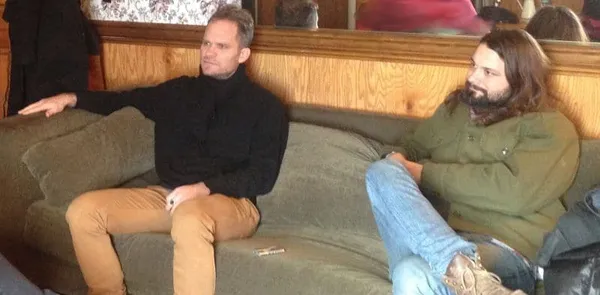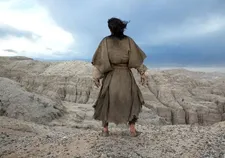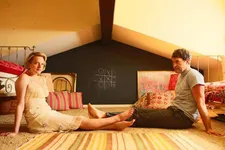 |
| Danny Bensi and Saunder Jurriaans at Sundance Photo: Maike Eilert |
I caught up with them in a Sundance cubby hole to discuss their work. Bensi, who was born in Denmark to an American mum and Italian dad and has a distincitve English accent thanks to time spent in Britain as a child, is the more chatty - and self-deprecating - of the two, insisting that he often leaves the room for lunch when it comes to letting Jurriaans check out what he's been working. His short back and sides contrast strongly with the hard rock-style long hair and beard combination of his Seattle-born composing partner, who was the first member of his Dutch family to be born in the States. When it comes to creating memorable scores together - they are most certainly on the same page.
The pair first met when Jurriaans was in college.
"He was at the Rhode Island School of Design where he was studying sculpture back in 96 and his roomate in college was my best friend from growing up, who I was just going to visit," says Bensi, who originally trained as a cellist. "So we got to talking and he had a guitar in the room, and I said
He came and sat in with us and played a bunch of gigs and then moved to New York with us," adds Jurriaans. The resulting band - co-founded with Gregory Rogove was Priestbird. So how did the composing start?
"There was a period where the band had sort of dissipated a little bit and we had finished touring, and we thought, what shall we do now. We were tired of the month-to-month - we'd been doing it for years - and we wanted to be more serious about our careers and about earning better money because being in a band is rough," says Bensi. "And we were getting older and wanted to have a studio and work - and one thing led to another and it spiralled very quickly."The composers have barely looked back since, with recent scores also including Magic Magic and Simon Killer. They say that it comes down to a strong working relationship.
"For some reason we've got along for almost the past 20 years," says Jurriaans.
"We still can't believe what we're doing I think, so there's no room for, 'Well, I really think it should go like this, this music and I'm not talking to you until it's ready', adds Bensi. "It's really more just getting the job done. 'Do you like this?' 'Yes.' 'I think maybe we should take the violins out for this section.' 'Okay.' It's all about whether it's working for the director or not anyway.
"It really comes down to egos in the end, too. I'll come in one morning and Saunders, who comes in earlier than I do, will be, like, 'Hey, I've started the movie, have a look, what do you think?'. Being able to approach the other is good. Ninety-five per cent of the time we're like, 'Cool, that's great'.
Putting the director first seems to have worked well for them, with the work continuing to flood in, with upcoming projects including David Gelb's A Faster Horse.
"We became very good friends with all the people we worked with too and I think that's why we get recommended for other projects," says Jurriaans. "In New York, especially, the community's pretty tight, so once you're in, you start to know everybody."
So how does the process work?
"We often do a first screening with temp music in it, so we'll get a good idea of what the movie's like," says Bensi. "Sometimes they'll send us the script, but I personally don't like that, he likes it more. I can't see what a movie's going to be like from a script, honestly. Oh, that script reads really well? I'm, like, what? So we'll see a first screening and get a vibe from there and have a sit down with the director - also a part I don't really like, Saunders is much better than me. Talking about music that doesn't exist yet - it's hard. Why are we sitting here for an hour talking about music that doesn't exist yet? But at least you can get some adjectives and descriptions. But where are you going to start? Don't know. We'll just jump to a scene and start."The pair's scoring is thrives on variation, with Enemy playing heavily with jazz notes, while Last Days In The Desert - a much quieter movie which sees Ewan McGregor take on the role of Jesus - offers a more contemplative tone.
"I think we're still discovering ourselves," says Bensi.
"Also, we're constantly challenging ourselves." adds Jurriaans. "Every movie we get we want to do something different because it's fun for us, like percussion or guitars or something that's different from the last movie. It's not fun for us rehashing, say, something that we did for Martha Marcy May Marlene. So I think that's also probably why we do it - we want to keep it interesting."
Speaking about Last Days In The Desert, Bensi adds: "That was a very exciting project from the get-go. So quiet and picturesque and then Ewan McGregor on screen, we just knew we could do all sorts of things. We had talked to the director beforehand and we knew that he didn't want choirs and organs - religious - and he didn't want a Hollywood orchestra either, so we knew we were dealing with a minimalist score and how we could put it against all these landscapes and Ewan McGregor playing Jesus was a wonderful challenge. Less is more is always an artistic guideline that you want to go by, isn't it?"
 |
| "We knew we were dealing with a minimalist score and how we could put it against all these landscapes and Ewan McGregor playing Jesus was a wonderful challenge." |
Jurriaans says that scoring documentaries such as A Faster Horse - which celebrates the 50th anniversary of the Ford Mustang - requires a very different approach to narrative scores.
"I think we get hired to do them because we don't score them traditionally like a documentary is supposed to be scored, in that kind of stand-offish way, but basically go a little deeper, he adds.
"You've got to be so careful not to be cheesy," says Bensi, who adds that one of his pet hates is heavy-handed scoring on TV documentaries.
"It's sad because it infects how people listen to music but it's manipulative and doesn't do music justice, it's kind of making fun of music in a way," says Jurriaans.
"What we do - and I don't know if this is going to come out quite right - but basically we did this with The Wolfpack and Last Days - is that we pick a point of perspective from where to compose from," adds Bensi. "So, this may sound silly, but in Last Days In The Desert, we were writing from the point of view of the desert, so you're not commenting on every single thing that's being said but the story is unfolding and it is as if the desert is sort of watching and allowing the story to play out, so there's like a distance from the characters.
 |
| "The house was the one commenting on, almost manipulating, the story." |
So does having a bigger name lead like Gyllenhaal or McGregor affect their stress levels?
Speaking about Enemy, Bensi says :"I did have a small panic attack. But I was really hungover. They came at 10am on a Saturday morning and I remember being, like, 'Oh wow'. There was a lot of music in there and they had it temped perfectly, although it was nothing like what we ended up with. I just remember being very daunted and Jake Gyllenhaal's faceall over the place. And [I thought] now you guys are going to want to talk about music that doesn't exist again."
Jurriaans adds: "When there's a bigger actor in the film, I feel like we can be more bold. I don't know why that it is."
Certainly, the stars in their films seem to keep coming with Glenn Close, Frank Langella and Olivia Thirlby all featuring in their upcoming fiction film 5 To 7, directed by Victor Levin, which is due for release in the US this April.
"It's sort of a comedy drama set in New York, and we were talking to the director and saying there are like 10 to 15 composers who can nail this for you in New York, come on," says Bensi "But he really liked us and he's like, 'You know who my favourite composer is? Ennio Morricone... that's kind of what I want.' And we were, like, well, we've never done anything like that before, we'd love to try but we don't have examples we can show you. And we ended up getting hired for the job because I think we were honest about it and told them our process and how we were going work. And we ended up with a pretty Ennio Morricone type score, from something like Cinema Paradiso - we watched that and it's so melodramatic. We toned it down a bit, but the director was, like, 'Surprise me, go over the top romantic'.
Read what Ewan McGregor and Rodrigo García said about Last Days In The Desert here.
5 to 7 opens in US cinemas on April 3 and will be available on VoD in the States from April 10, watch the trailer below:





















